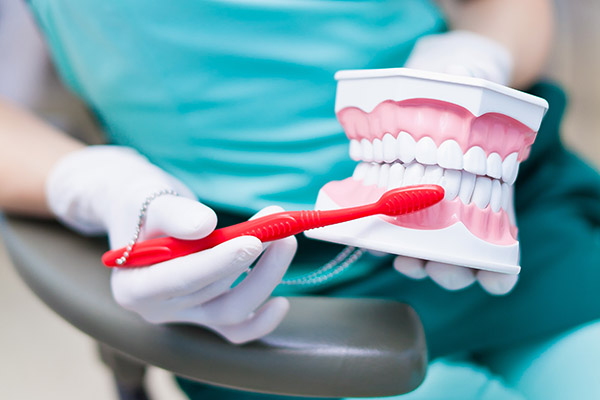A General Dentist Discusses the Importance of Gum Disease Treatment

Brushing and flossing your teeth consistently can help prevent gum disease and tooth loss. Gum disease, also commonly known as periodontal disease, is caused by plaque. This is a sticky film of bacteria that constantly forms on the teeth. The good thing is that gum disease can be successfully treated. However, it is important to seek treatment early to avoid any negative consequences.
Gum disease
Gum disease is an inflammation of the gums that requires early treatment to resolve. When not treated, the inflammation can cause the gums together with the supporting bone structure to deteriorate. This often leads to gum recession and in severe cases, tooth loss. Here is a breakdown of the stages of gum disease and how it affects the gums.
Stages of gum disease
The early stage of gum disease is referred to as gingivitis. It can cause the gums to become swollen, red, and to bleed easily. But at this stage, it is still reversible. In many cases, it can be eliminated by good oral home care and a professional cleaning at the dental office.
Advanced gum disease is commonly known as periodontitis. Chronic periodontitis affects a very large percentage of adults in the United States. It can lead to the loss of bone as well as tissue that support the teeth. It usually becomes more severe over time.
If it reaches this point, the teeth will feel loose, and they usually begin moving around in the mouth. Although this form of periodontitis is very common in adults, it can occur at any age. Aggressive periodontitis is another form of periodontitis that occurs in patients who are clinically healthy. It is characterized by a rapid loss of bone and tissue.
Gum disease and other conditions
Gum disease has been associated with other health conditions like stroke or diabetes. But it is important to note that this does not mean that one disease causes the other. It just means that one condition or disease often appears at the same time as the other. But research between periodontal diseases and systemic diseases is still ongoing.
Prevention
There are several habits that usually help to reduce the risk of gum disease. Exercising good oral hygiene is immensely important. Brushing after meals will help remove plaque and food particles trapped between the gums and teeth. Cleaning the tongue is also necessary since it can harbor bacteria.
Flossing removes plaque and food between the teeth and along the gumline that the toothbrush cannot reach. Using a mouthwash can help remove food particles that flossing and brushing missed. It can also help reduce plaque. Patients should ask their dentists about effective oral care products.
Takeaway
If detected in its early stages, gum disease can be easily treated, so you should see your dentist if you suspect you have it. If not treated, it can lead to a much more serious condition. But you should always try to reduce your risk of gum disease. This may involve brushing and flossing every day, using a mouth rinse, and scheduling regular dental visits.
Request an appointment here: https://www.alluredentalchicago.com or call Allure Dental at (312) 248-7517 for an appointment in our Chicago office.
Check out what others are saying about our services on Yelp: Read our Yelp reviews.
Recent Posts
The CDC states that gum disease, also known as periodontal disease, is one of the leading oral infections in the United States. In addition, the National Institute of Health cites it as the most common culprit for adults losing teeth. Because the early stages of periodontal disease often do not have noticeable symptoms, many patients…
Gum disease is a serious condition that can result in a need for periodontal treatment. Treatment is needed in order to destroy the infection and prevent it from getting worse. Oftentimes, without treatment, a case of gum disease can become advanced, which can result in tooth loss, receding gums, and even jaw deterioration, all of…
Avoiding gum disease at all costs is essential, as once someone is diagnosed with this dental-related disease, it means that they are in need of additional dental treatment to restore their good oral health. Even though gingivitis is the mildest form of gum disease, it can still cause harm to one’s overall good oral health.Thinking…
There are different stages of gum disease, with each stage being based on the severity of the infection. Because there are different stages of gum disease, it can be difficult to differentiate between each one. When trying to determine what stage the infection is at, it is best to begin with a visit with a…


